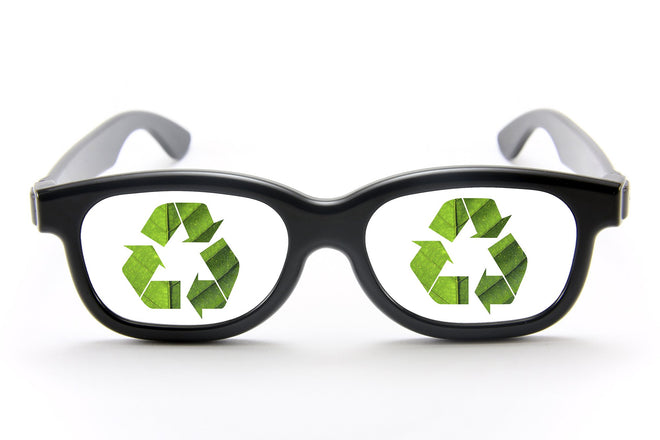According to the Vision Council, Americans buy new glasses every two years on average. As a result, eyewear of all types end up abandoned under beds, in dresser drawers, buried in couch cushions, and ultimately in landfills - but that doesn’t have to be the case.
There are millions of people around the world who cannot afford the corrective eyewear they need to function normally in society. For example, those doing near work for a living in developing countries would thrive with your old glasses.
So, whether you’ve had LASIK surgery, your prescription has changed, or you are just simply trading up, consider donating or recycling your used eyewear.
4 Reasons to Donate Old Glasses
From boosting test grades and saving our planet to promoting social and economic growth, donating and recycling glasses is a smart move. Below are a few reasons why you should consider donating your glasses instead of throwing them out:
1. Recycling Eyewear Reduces Barriers to Education
Donating or recycling old spectacles has a major influence on improving educational opportunities on a global scale for those who cannot afford them. Children living in poverty do not have access to the correctional lenses they need to fully shine. For example, in a study by UCLA, children who received glasses were more engaged in their studies and saw a 4% positive trajectory over a year.
2. Keeps Unnecessary Litter Out of Landfills
As the global human population continues to climb, the positive relationship between pollution and population has us scrambling to reduce our footprint. A great way to do your part is by donating or recycling your eyewear to keep plastics out of our landfills.
3. You’ll Be Promoting Global Economic and Social Growth
With millions of people living in developing countries unable to afford the correctional lenses they need, their economic and social growth remains slow. A report from the Overseas Development Institute found that if all agricultural workers requiring glasses had access to them, they would net $180 billion in total economic benefits. For example, $19 Billion in India, $10 Billion in Nigeria, and $2.5 billion in Malaysia.
4. Tax Breaks
Lastly, just like any other charitable donation, your eyewear contribution could count towards a tax dedication come April. You can deduct the fair market value of your glasses on your taxes using a form 1040. That said, there are very specific regulations around charitable tax breaks and you’ll want to consult with a professional tax expert before claiming your donation.
Bulk Eyeglass Recycling Programs
There are many organizations that accept glasses in bulk as they distribute them to those in need around the world. Those organizations are:
- New Eyes for The Needy: Since 1992, New Eyes has distributed millions of pairs of glasses to those in need in both the United States and developing nations around the world.
- Lions Clubs International: After realizing millions of people around the globe lack access to basic eye care, Lions Club stepped in and developed its community-based Lions Recycle For Sight Program.
- OneSight: In 1988, OneSight had an idea to give 25 pairs of glasses to local children who couldn’t afford them and the rest is history.
- VSP Global: From mobile clinics with professional optometrists to hosting fundraising events at scale, VSP Global collects and distributes eyeglasses to those in need throughout the World. Ready to donate your glasses? Print a shipping label and mail them to VSP.
If you are looking to only donate a couple of pairs of glasses, you may want to look for a local option first. The above organizations typically work with retailers who donate unsold product in bulk. That said, they would still be happy to take any old glasses off your hands.
Where to Donate Eyeglasses Near You
Local Optical Stores
A great option for donating glasses is your local optical store. Most optical chains have some sort of eyewear recycling program that you can take advantage of. The following are a few chains that may be in your area:
- LensCrafters: You can donate prescription glasses and other eyewear at your local LensCrafters.
- Pearle Vision: Pearle Vision accepts eyewear donations at any of its domestic locations.
- Walmart: Find your local Walmart vision center to donate your old glasses.
Local Charitable Non-Profit Organizations
Another great option for local glasses donations is charitable non-profit organizations. The following are types of organizations you can look for in your area:
- Homeless Shelters: Major cities have shelters for those experiencing homelessness and are always in need of both reading and prescription glasses to distribute to those who come through its doors needing a helping hand.
- Thrift stores: Thrift stores, such as Goodwill, are a great place to recycle your used glasses.
- Religious Ministries: Local religious ministries often collect glasses to distribute on medical missions to developing countries.
Find a local non-profit to donate glasses to near you by visiting Great Non-Profits.
Community Drop Boxes
Lastly, one of the easiest options for donating glasses is to locate a local Lions Club Community drop box near you. You can find drop off boxes throughout your city at the following locations:
- Local library: Local library branches are a safe bet when it comes time to donate eyeglasses.
- Banks: Some smaller bank branches may have glasses donation drop boxes inside their main lobbies.
- Schools: Your child’s school or local college may have a donation box set up to collect a variety of eyewear, including prescription glasses.
- Worship Centers: Places of worship gladly accept gently used eyewear and will regularly distribute them throughout the community to those in need.
- Community Centers: Community centers offer life-improving services such as health and family assistance and typically have donation stations for glasses and other items.
Find glasses donation drop off locations near you by contacting your local Lions Club.
Things to Consider When Donating Used Eyeglasses
While donating and recycling glasses is highly recommended, there are times when you should find other solutions for disposing of your old eyewear. Please consider the following before donating glasses:
- Glasses Must Be Complete: When donating eyeglasses, they must be fully functional, meaning the frame includes lenses.
- No Major Wear and Tear: For donations, your glasses must be gently used. In other words, they need to be in good to excellent condition.
- Think Local: While donating a pair of glasses to a global organization is perfectly fine, it’s a good idea to first research your local options.
- Clean Your Glasses Before Recycling: Lastly, before you donate eyeglasses to any organization or pass them along to someone else, it’s important to thoroughly clean and sanitize both the frames and lenses.
Ready for a new pair of readers?





